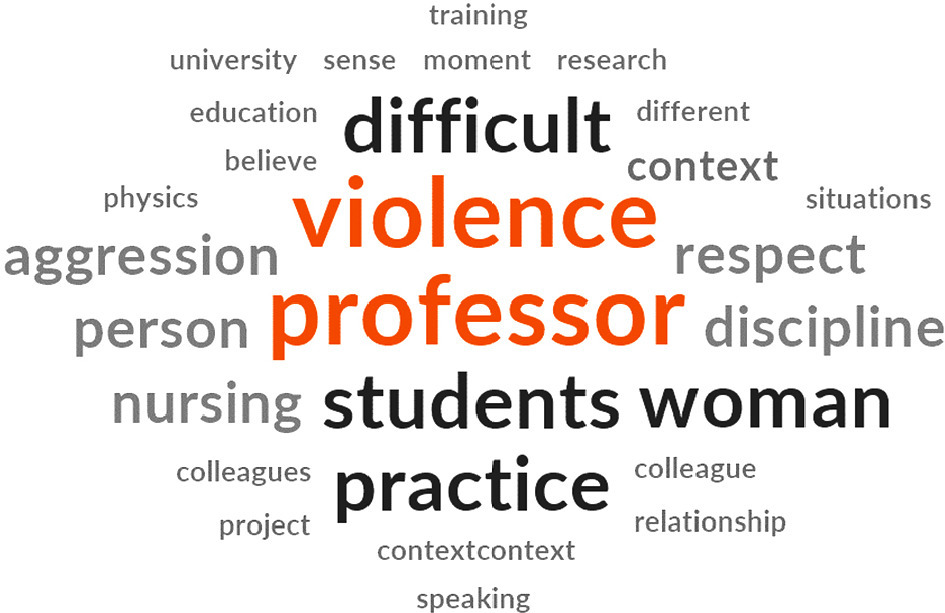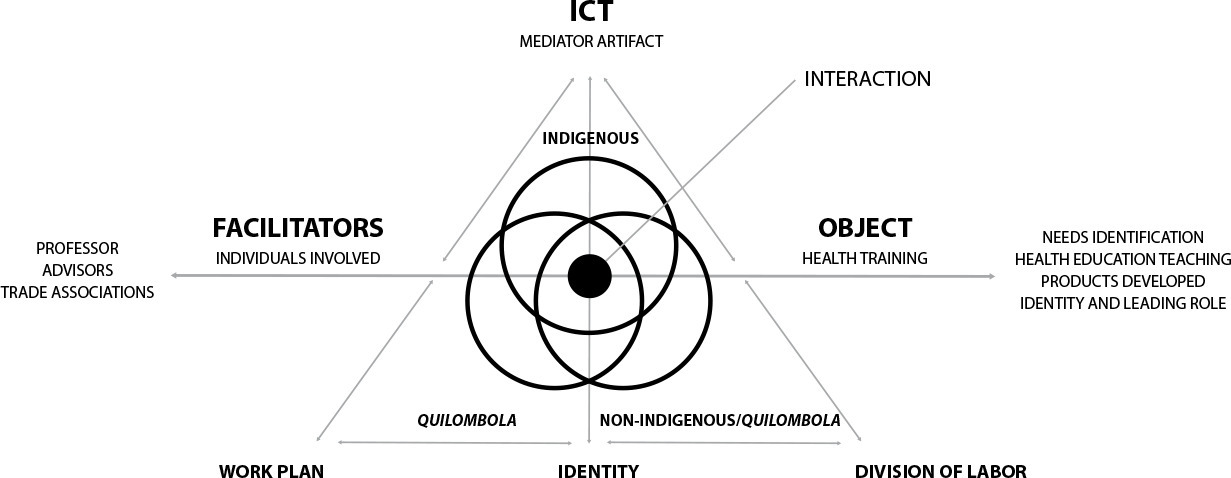-
ORIGINAL ARTICLE
Indicators of emotional distress and mindfulness in undergraduate students: a cross-sectional study
Revista Brasileira de Enfermagem. 2024;77(5):e20230499
10-07-2024
Abstract
ORIGINAL ARTICLEIndicators of emotional distress and mindfulness in undergraduate students: a cross-sectional study
Revista Brasileira de Enfermagem. 2024;77(5):e20230499
10-07-2024DOI 10.1590/0034-7167-2023-0499
Views0See moreABSTRACT
Objectives:
to assess the association between indicators of emotional distress and dispositional mindfulness in health students at a Brazilian federal public university.
Methods:
a cross-sectional study, developed with university students in the health area of a public institution from May to June 2022. In the analysis, multiple linear regression was used using SPSS software.
Results:
the sample was mostly female, ≤ 22 years old, non-white, studying the first semesters, with a higher prevalence for the medicine course. Students presented moderate dispositional mindfulness scores. It was observed that the variables of stress, depression and current suicide risk were associated with the capacity for mindfulness.
Conclusions:
knowing the indicators of emotional distress that are related to the potential of mindfulness can contribute as a situational diagnosis to better design strategies that promote the improvement of emotional indicators of health students.
-
ORIGINAL ARTICLE
Negative affectivity in university students and its relationship with academic performance and professional outlook after COVID-19
Revista Brasileira de Enfermagem. 2024;77:e20240040
08-30-2024
Abstract
ORIGINAL ARTICLENegative affectivity in university students and its relationship with academic performance and professional outlook after COVID-19
Revista Brasileira de Enfermagem. 2024;77:e20240040
08-30-2024DOI 10.1590/0034-7167-2024-0040
Views0See moreABSTRACT
Objectives:
to evaluate the prevalence of negative affectivity in university students in the post-COVID-19 pandemic context and its relationship with academic performance and professional outlook.
Methods:
a cross-sectional study was conducted with undergraduate students from a public university in Minas Gerais between September 2022 and September 2023. Data were collected using a sociodemographic and psychosocial characterization questionnaire and the Depression, Anxiety, and Stress Scale 21. The relationships between negative affectivity, academic performance, and professional outlook were verified using the Kruskal-Wallis test, with a significance level of 5%.
Results:
a total of 585 students participated in the study. A high prevalence of depression, anxiety, and stress was found among university students in the post-COVID-19 context, with a notable severity of anxiety. A negative association was detected between the investigated negative affectivity, academic performance, and professional outlook.
Conclusions:
the results indicate an emotional vulnerability in university students, with a relationship between negative affectivity and a decline in academic performance and professional outlook.
-
ORIGINAL ARTICLE
The use of individual tracking programs in public health: a bioethics dilemma
Revista Brasileira de Enfermagem. 2024;77:e20230041
08-19-2024
Abstract
ORIGINAL ARTICLEThe use of individual tracking programs in public health: a bioethics dilemma
Revista Brasileira de Enfermagem. 2024;77:e20230041
08-19-2024DOI 10.1590/0034-7167-2023-0041
Views0See moreABSTRACT
Objective:
to understand the bioethical perspectives on mobile tracking device use.
Methods:
theoretical study based on action research, carried out with eight graduate students from a public university. A focus group was used, with a thematic content analysis methodology with a codebook structure, approved by the Research Ethics Committee.
Results:
from the analysis, there was a concern about using devices after the pandemic ended. Using or not the device, rights inherent to humans, legislation and effectiveness of methods deepen interpretations, moving participants from a personalistic conception of the topic to a vision focused on professional implications about the methods.
Final considerations:
the debate on the impact of using technological devices on health, especially those that imply restriction of rights that refer to individuals’ private life, involves a discussion of a professional nature, in addition to requirement for clear rules on the topic.
-
ORIGINAL ARTICLE
Cardiovascular Risk and Lifestyle: comparison between teaching workers in Portugal and Brazil
Revista Brasileira de Enfermagem. 2024;77(2):e20230354
06-14-2024
Abstract
ORIGINAL ARTICLECardiovascular Risk and Lifestyle: comparison between teaching workers in Portugal and Brazil
Revista Brasileira de Enfermagem. 2024;77(2):e20230354
06-14-2024DOI 10.1590/0034-7167-2023-0354
Views0ABSTRACT
Objective:
Compare Cardiovascular Risk between workers in Brazil and Portugal who work in the teaching context and its relationship with Lifestyle and Common Mental Disorder.
Methods:
Cross-sectional study that compared the cardiovascular health conditions of teaching workers in Manaus (Brazil) and Coimbra (Portugal). The odds ratio between groups was estimated.
Results:
The differences were: Smoking and hypercholesterolemia in participants from Portugal. Hypertension, chronic disease, increased abdominal perimeter, common mental disorder, and absence from work in Brazil. The variables with the greatest effect for high cardiovascular risk were: Country-Portugal [17.273 (95%CI1.538-193.951)], sex-male [61.577 (95%CI5.398-702.469)] and smoking [593.398 (95%CI57.330-6.142.020)].
Conclusion:
The differences in risk between groups showed that participants from Portugal, men, with high blood pressure and/or smokers are the most vulnerable to having a cardiovascular event. There is a need for interventions to promote cardiovascular health in the workplace in both countries.
Keywords:Community-Based Participatory ResearchHeart Disease Risk FactorsLife StyleOccupational HealthUniversitiesSee more -
ORIGINAL ARTICLE
Quality of life and satisfaction of students with auriculotherapy in the covid-19 pandemic: a quasi-experimental study
Revista Brasileira de Enfermagem. 2023;76:e20220522
02-03-2023
Abstract
ORIGINAL ARTICLEQuality of life and satisfaction of students with auriculotherapy in the covid-19 pandemic: a quasi-experimental study
Revista Brasileira de Enfermagem. 2023;76:e20220522
02-03-2023DOI 10.1590/0034-7167-2022-0522
Views0See moreABSTRACT
Objectives:
to evaluate the quality of life before and after the application of auriculotherapy and the satisfaction of university students with the treatment during the covid-19 pandemic.
Methods:
quasi-experimental study conducted with 44 students in a University Health Center. The intervention consisted of ten sessions of auriculotherapy focusing on emotional changes with quality of life assessment before and after treatment. The study also investigated the satisfaction concerning the intervention.
Results:
predominated among the students: women, from health courses, in use of psychotropic drugs and complaining of emotional changes. There was a statistically significant increase in all domains of quality of life, and students were satisfied with the treatment.
Conclusions:
auriculotherapy improved the quality of life of university students during the covid-19 pandemic, and the level of satisfaction with the treatment was high.
-
ORIGINAL ARTICLE
Tangency and multiple factors of violence against lecturer: nuances of the experience in pedagogical practices in health education
Revista Brasileira de Enfermagem. 2023;76(1):e20210865
12-16-2023
Abstract
ORIGINAL ARTICLETangency and multiple factors of violence against lecturer: nuances of the experience in pedagogical practices in health education
Revista Brasileira de Enfermagem. 2023;76(1):e20210865
12-16-2023DOI 10.1590/0034-7167-2021-0865
Views0See moreABSTRACT
Objective:
to identify factors that lead the teacher to experience violence in their pedagogical practice in health education.
Method:
research with a qualitative approach, based on the Grounded Theory, conducted with 11 professors of the nursing course of a public university in the central region of Brazil in 2020 and 2021. Online semi-structured interviews were analyzed partially in the light of the Constructivist Grounded Theory.
Results:
factors that lead lecturer to experience violence are characterized by institutional culture, gender, professor’s perception of violence, and the triggers that drive students to commit violence. Social status and inequalities lead to positions of domination and, consequently, create a fertile ground for violence.
Final Considerations:
analyzing violence under Bourdieu’s theory, it is clear that student violence towards lecturer and the reports contained in this study deserve pedagogical reflection. However, it is necessary to include these discussions as a background in teaching environments.






